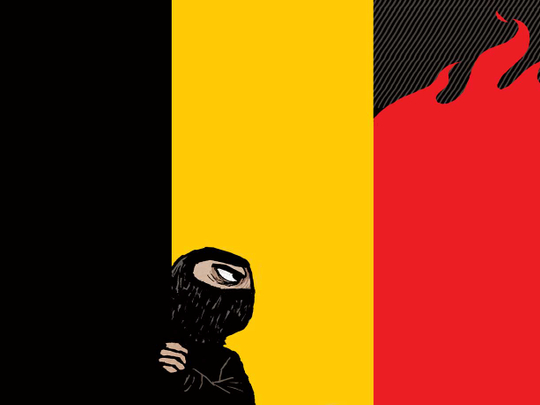
A few days ago, I asked General Eddy Testelmans, head of Belgium’s military intelligence service, what lessons should be drawn from the Paris attacks. His answer was terse and to the point: “The main lesson is that the Belgian security apparatus has been neglected too much in the past years.” He was also asked about the possible presence of sleeping terrorist cells in Belgium. The answer — given before Tuesday’s atrocity and the death of up to 31 people — was published yesterday in the magazine I work for, Knack.
“We have to assume that that risk is still existing. Otherwise, the threat level would not be on ‘three’, the one but highest stage. We have always assumed that there are people in Belgium that at one point can gather and get their hands on weapons and explosives in order to use them.” Unfortunately, he was prescient. And he wasn’t the only one.
Last December, Andre Vandoren stepped down as director of Belgium’s coordination unit for threat assessment, the central player in the Belgian fight against terrorism. During his final interview, published in MO magazine, I asked him about the extent to which Belgium was actually prepared to cope with a terrorist attack. “A lot of initiatives have been put in place to deal with those kind of crisis situations,” he answered. “But one can always be surprised when being confronted with situations like New York, Paris, Madrid or London.”
Of course, no state can ever be sufficiently prepared. But the truth is that in Belgium, the existence of a threat was widely understood. In August 2012, the first foreign terrorist fighters left Belgium for Syria. Meanwhile, the number has risen to more than 450 Belgian residents who left for Syria, mainly joining the ranks of Daesh (the self-proclaimed Islamic State of Iraq and the Levant) and Jabhat Al Nusra. The Belgian prosecutor’s offices have opened more than 270 criminal investigations into the subject matter. And according to the intelligence services, some 120 foreign terrorists have returned to the country of chocolates. Not all are ticking time-bombs.
But events over the past year clearly indicated that returnees posed a threat that needed to be taken seriously.
First there was the attack on the Jewish museum in Brussels, in May 2014. Then, against the backdrop of the first assault on Paris — the murders at the offices of the French satirical magazine Charlie Hebdo — a terrorist plot was exposed and dismantled in the southern Belgian city of Verviers. At that stage, the Belgian security services, who were fired upon by terrorists during the operation, were praised for their effectiveness. But that would not last. After the Paris attacks of November 2015, when 129 people were killed in a series of terrorist attacks, Brussels emerged as a logistical hub and was heavily criticised internationally. The caricature drawn was that of a failed state, but that was wrong, as evidenced by a recent interim report by the standing intelligence agencies review committee, which absolved the Belgian intelligence services, the state security and the military intelligence of blame.
The arrest of Europe’s most wanted man, Salah Abdeslam, last Friday in Brussels prompted congratulations from United States President Barack Obama, but even then, officials, accustomed to a cycle of praise and brickbats, were careful. “A battle was won, but the war is not over yet,” was an oft heard comment from them.
Belgium’s struggle against terrorism comes not in black or white but shades of grey. Since the dismantled plot in Verviers, Belgian prosecutors, police and intelligence officers have been in overdrive to avoid the nightmare scenario that is now reality. Internal collaboration as well as information-sharing with foreign services has been intensified.
But Belgium has been trying to fight a growing threat with a relatively small security apparatus. Although Brussels is the diplomatic capital of the world, Belgian state security has only about 600 employees (the exact figure is classified information). Its military counterpart, meanwhile, the Adiv, has a similar number. That makes just more than a thousand intelligence officers to secure a country that hosts not just Nato and the EU institutions but countless other organisations.
After years in which successive Belgian governments failed to invest in the Belgian security apparatus, the government of Prime Minister Charles Michel, who took office in 2011, has understood the scale of the challenge and the gravity of the threat. An additional budget of €400 million (Dh1.64 billion) for the fight against terrorism and radicalisation was announced after the Paris attacks.
The state security and military intelligence have been promised some 100 additional intelligence officers each. And last Thursday, the Belgian government approved a new law expanding the toolbox of the intelligence services, including the legal possibility to intercept data from fibre cables. There never was a lack of willingness to confront the problem. Judging from the relatively small size of Belgium’s security apparatus, perhaps there has been a failure to understand the depth.
It will inevitably be asked whether a more powerful security apparatus could have avoided these attacks. Who can be sure? Bigger countries with bigger services haven’t managed to avoid violent calamity. Perhaps the most effective protection for Belgium isn’t more hard power, rather to be steadfast as a healthy democratic society.
— Guardian News & Media Ltd
Kristof Clerix works as an investigative journalist for the Belgian weekly magazine Knack. He has published two books about the Belgian intelligence services.










